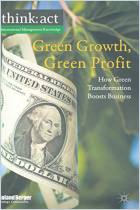Join getAbstract to access the summary!

Join getAbstract to access the summary!
Ernst von Weizsäcker, Karlson 'Charlie' Hargroves, Michael H. Smith, Cheryl Desha and Peter Stasinopoulos
Factor Five
Transforming the Global Economy through 80% Improvements in Resource Productivity
Earthscan, 2010
What's inside?
How to balance economic growth with resource sustainability by reducing energy use by a factor of five
Recommendation
Recycling garbage, turning off lights, taking shorter showers: All these actions contribute to the reduction of energy consumption. Written as a joint project by Ernst von Weizsäcker, the author of Factor Four, and by four experts from The Natural Edge Project, an environmental research group, this call to action argues for a “whole-system approach” that unites engineers, designers, scientists and builders to create new products, processes, buildings, homes, factories and stores to reduce energy consumption by 80%, diminishing it to one-fifth of current usage, by 2050. A mountain of research, statistics, case studies and examples provide a strong, documented case that achieving “sustainable consumption” without forgoing prosperity not only is possible but necessary. getAbstract recommends this work to policy makers, executives, engineers, designers and all those who want to know why they should keep separating their plastic from their glass.
Summary
About the Authors
Ernst von Weizsäcker, lead author of Factor Four, is co-chairman of the UNEP International Panel on Sustainable Resource Management. Karlson Hargroves, Michael H. Smith, Cheryl Desha and Peter Stasinopoulos are members of The Natural Edge Project (TNEP).























Comment on this summary